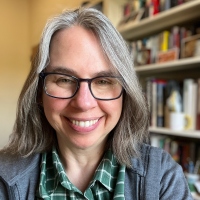Interested in learning more about Bass Connections from the point of view of faculty? Here, Duke faculty members reflect on their experience. Inspired? Learn how you can get involved in Bass Connections.
Faculty Perspectives
I think one of the roles of the arts and humanities is to help us think about how to engage, ask questions and analyze technologies in a productive way. That's what I've tried to bring to all of my projects. full profile »
Bass Connections has been one of the most exciting and sustaining parts of being a faculty member at Duke. full profile »
Through Bass Connections, I’ve been able to work with faculty from both Trinity and the Duke Global Health Institute, as well as students who are interested in psychology, global health and many other disciplines across campus. full profile »
When you have good communication, your students learn to be good mentors, and they also learn to provide good feedback to their mentors in the program. I've learned a lot from them over the years, and ultimately, this structure fosters a more modern idea of what leadership is. full profile »
These scholars, students and community partners have not only helped to shape the science of human development but have generated insights with real-world implications for policy and practice. full profile »
Our team is divided into five subteams, each of which is focused on a separate (but interconnected) element of the team’s research. These subteams work as individual units but come together to share research progress, brainstorm new ideas and answer pressing questions. full profile »
As project managers, graduate students serve as a critical bridge between faculty and undergraduates. full profile »
For many students, it is the first time they have received this type of mentorship. Know that you are shaping part of their college career. They will rely on you for mentorship in a range of areas. Be prepared to write some letters of reference as well! full profile »
I really involved the students in what the goals and deliverables ought to be ... I have seen that the leaders announce themselves. full profile »
How do we improve the learning experience for all students? Increase retention in STEM, make the classroom a better place and raise motivation, engagement and belonging. full profile »
What’s been surprising is how much engagement we’ve seen from the undergrads – how much they’re sharing their own experiences in the classroom, talking about what it’s been like to be women in STEM, but also finding the things we all have in common that led us to be in that room in the first place. It has been really interesting and rewarding. full profile »
Bass Connections has been a really nice way to make connections with students on a one-on-one basis and do more in-depth research with them individually, both throughout the time of the project team and also going forward. full profile »
Students are learning about electricity access and the needs of the communities that we’re talking about. They’re learning how to implement machine learning algorithms to see if this is a realistic and potentially feasible product. This leads to uncertainty: this technique may or may not work, and sometimes our next steps depend on what we learn along the way. full profile »
My multiyear Bass Connections project with Anirudh Krishna provided the analytical and empirical foundation for several successful grant proposals and several years’ worth of sustained work in the slums of India. So far that work has produced a gaggle of published papers and two dissertations—and courtesy of policy engagements, I am now doing related work elsewhere. full profile »
I am engaging in a wholly new set of important questions about how mercury is being added to and cycling through the Peruvian Amazon. This would not have been possible without Bass Connections’ support. I think we are already generating vitally important information to guide management and policy—we are providing the first ever measures of soil and water methyl mercury (the bioavailable form) in Peru—and we are poised to provide far more. full profile »


















